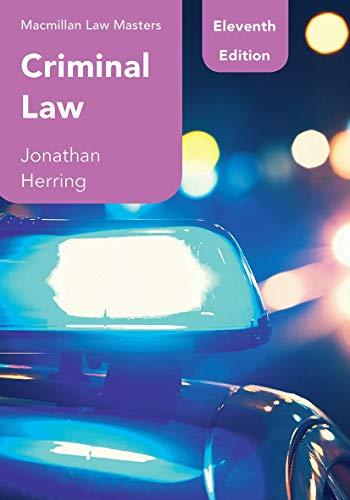help please...business law
1.
Business Law 1: "You Be The Judge" Case Problems Unit 1 Disney v. Kellogg (Methods of Dispute Resolution/Remedies, Chapter 2): Disney owned copyrights for the Cinderella and Snow White movie characters and licensed them to Kellogg's to use on their cereal and granola bar packaging and advertising in the United States. Their licensing contract stated that "all disputes would be settled by arbitration." The owner of a coffee shop down the street from Kellogg's CEO asked the Kellogg CEO if they could use the Cinderella and Snow White characters on their new kids beverage, the "Babyccino". Kellogg's CEO gave the coffee shop permission to do so, without telling Disney that he had done so. Disney learned of that deal between Kellog's and the coffee shop and filed a lawsuit against Kellogg's for fraud and theft. Does this dispute go to trial or arbitration? People v. Stimler (Chapters 1 & 2): Mark Stimler is charged with the crime of theft. Specifically, he is accused of stealing a diamond necklace from the home of his neighbor, Abby Kim. Stimler chooses to have his case decided by a judge, rather than a jury. At the end of the trial, the judge in the case finds him guilty. In his opinion, the judge explains that he did not think there was evidence showing that Stimler had committed theft. However, the judge said that because Stimler was not supposed to be on Kim's property anyway, he should be found guilty because the judge believes the law should be that being on a person's property without permission is enough for "theft." Stimler appeals his conviction and argues that he should have been found innocent? What will the appellate court likely decide? Unit 2 Wilson v. Lopez (Chapter 6): Lopez, a local TV anchorman, was stopped by Officer Steven Wilson, and given a ticket for not having a front license plate and having expired registration. Officer Wilson did not let Lopez drive off after he gave him the ticket, but allowed him to leave the car in a car dealer's parking lot nearby. On the local news that night, Lopez prefaced his reading of the nightly news with the comment that he was angry and upset and probably not thinking straight because of a ticket he had been issued earlier that day. He then went on to say that "Officer Steven Wilson was "a Nazi", "a dictator", "an absolute barbarian", "a lunkhead", "a meathead" and "a nut." He continued to say that Officer Wilson's conduct was "outrageous" and "very unfair." In Officer Wilson's defamation lawsuit against Lopez, what would be the likely result? Marcum v. Bowden (Chapter 6): Donald and Gloria Bowden hosted a cookout at their home in Van Nuys, inviting mostly business acquaintances. Justin Parks, who was nineteen years old, attended the party. Alcoholic beverages were available to all of the guests, even those who, like Parks, were between the ages of 18 and 21. Parks consumed alcohol at the party and then left with other guests. One of these guests detained parks at the guest's home to give Parks time to "sober up". Parks then drove himself from this guest's home to his own and was killed when his car went into the center divider on the freeway. No other cards were involved in the accident. At the time of his death, he had a blood alcohol content of 0.291 percent, which far exceeded the state's limit for driving a motor filed a lawsuit in South Carolina state court against theRandall Hale worked as a seaman on an Exxon Shipping Co. oil tanker for eight years without incident. One night, he boarded the ship for duty while intoxicated. in violation of company policy. This policy also allowed Exxon to discharge employees who were intoxicated and thus unt for work. Exxon discharged Hale. Under a contract with Hale's union, the discharge was submitted to arbitration. The arbitrators ordered Exxon to reinstate Hale on an oil tanker. Exxon led a suit against the union, challenging the award as contrary to public policy, which opposes having intoxicated persons operate seagoing vessels. Can a court set aside an arbitration award on the ground that the award violates public policy? Should the court set aside the case? Explain. Business Law: IRAC Format Case: You Be The Judge - Perfect 10, Inc. v. Google, Inc.[1] Facts: Perfect 10, Inc. has a website on which it sells copyrighted images of nude models. Subscribers pay a monthly fee to view these photos. Perfect 10 also sells smaller images for use on cell phones. Sometimes, Google's image search engine displays thumbnails of Perfect 10's photos. (Thumbnails are low-resolution images measuring roughly 2 inches x 1.5 inches.) These thumbnails could also be used on cell phones, although there was no evidence that they had been so far. Perfect 10 filed suit alleging that Google was violating copyright law by reproducing the thumbnail images. The district court issued an injunction prohibiting Google from displaying Perfect 10's photos. Google appealed, alleging that the thumbnails were fair use. You be the Judge: Do Google's thumbnail displays of Perfect 10's photos violate copyright law? Are they a fair use? Question 1: What must a person prove in order to win an infringement action? Question 2: Didn't Google copy Perfect 10's work? Question 3: Then why is that not a copyright violation? Question 4: How does this doctrine make sense? It seems to fly in the face of the purpose of copyright protection









